Amelia Kyazze is a published author, photographer, editor and writing mentor. After an 18-year career working for humanitarian organisations, she set a new path for herself as a fiction writer. She’s about to release her third novel, which was picked up by HarperCollins, one of the world’s largest publishing houses. Amelia tells us what it’s like to launch a new writing career and how to find your own voice.
Hi Amelia, to start off with, tell us about yourself.
I grew up in the US and studied various subjects at university, from photography and art history to anthropology. I always had a keen interest in people and cultures. I then went to work for various humanitarian organisations. I’d always loved reading and writing from a young age. But when I reached a crossroads at work, I decided to come back to my fiction writing. It was initially a big juggling act of going to classes at night and weekends, while my children were still very young. I found my voice by transforming my different experiences around the world and here in London into fiction. I eventually got my Masters in Creative Writing, and now I’ve published three novels.
Congratulations on publishing three novels! But you went through very different routes to get them published. Talk us through your journey of eventually landing a deal with HarperCollins.
My first book, Into the Mouth of the Lion, was published in 2021. It’s a suspense novel that drew from my work as a photographer. The book wasn’t your usual thriller and didn’t fit neatly into your typical genre boxes, so I found a small independent publisher, Unbound, willing to take a risk on an unknown author. They have a crowdfunding model. It worked well for me, as I could fundraise through my networks across the UK and from working abroad. Friends, family and former colleagues were very supportive, and I also found a large number of new readers. Once I hit my fundraising target, Unbound handled the design, editing, publishing and marketing of my book.
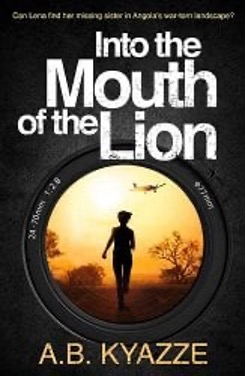
Amelia’s debut international mystery novel.
I released my second book, Ahead of the Shadows, a year later as a sequel. I didn’t want to crowdfund again. I had learned so much from that experience and built a great audience and contacts that I decided to do it alone and self-publish through my own publishing company, Humanity in the Landscape.
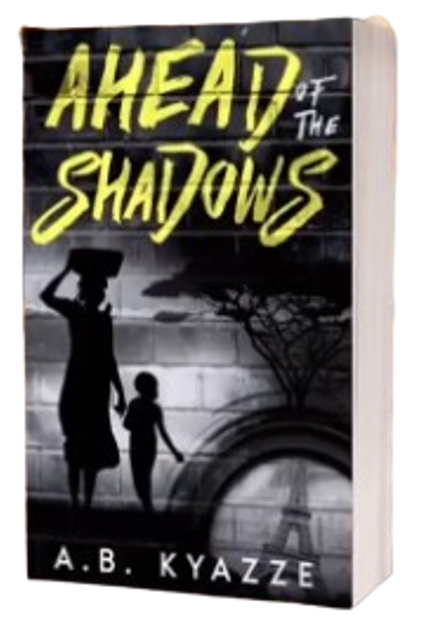
Amelia’s sequel to her first novel.
I’ve just released my third book, The Café on Manor Lane, which differs from my previous two books in that it’s inspired by my life here in London.
As many people know, London can be a harsh but beautiful place, and the kindness of strangers draws people from all backgrounds together.
I sensed that this book would have a broader appeal, so I contacted a wide set of publishers and agents. A subsidiary of HarperCollins had a short submission window, and said yes!
They’re also publishing the novel as an audiobook. That’s really exciting as a huge number of people are now consuming books that way.
Tell us about your new book.
The novel weaves together the lives of three generations of women connected through a café in London, with characters that reflect the rich diversity and complexity of the city. Amid the chaos and challenges of London life, it’s about how people are uplifted by the unexpected kindness of strangers, and chance friendships that withstand time.
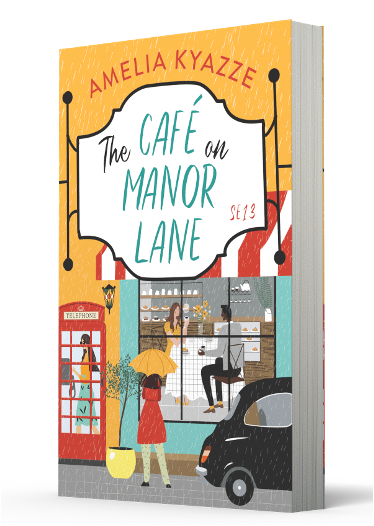
Amelia’s new book is out now – perfect for some summer holiday reading.
You used A.B. Kyazze as your author name with your other two books, but for your latest book, you’ve used Amelia Kyazze. Why do authors use different names or abbreviations for their books?
There are a few reasons for this, mainly due to the different genres of books and audiences. Thriller readers like a bit more mystery, while people reading wider fiction like to know a bit more about the author.
Where do you get your inspiration for your books and characters?
I find inspiration in my experiences, travel, and the every day. I loved writing as a child, and would write comedy sketches and perform them with friends. I have journals full of experiences, scenes and moments I’ve lived through, observed or imagined. But for any story or full-length novel, there needs to be a spark. It can be a scene, like a near plane crash that opens my first book. Or it can be a character, like a student struggling to find their way, as in the beginning of my latest book. In both cases, I’m a “discovery writer”; this means I don’t plan out the whole book, but rather I let the scenes, characters and story develop as I write.
You also offer workshops on the 7 senses to help aspiring writers. Tell us about that.
Writing the 7 Senses is a methodology I came up with to explore the joy and flow of creative writing. It’s for writers of all ages. It’s about writing from the five senses (sight, smell, hearing, taste, and touch). I then added two more senses: a sense of direction/movement and a sense of humour. Although not all writing can be funny, I believe any writing, whether serious or light-hearted, can be a mixture of light and shade. In each session I do with writers, we find other senses to add to the list: a sense of adventure, for example, or a sense of being watched. There are various exercises we can do to tap into our senses to improve and sharpen our writing.
Finally, what are your top tips for anyone aspiring to be a writer?
Find your passion
If you love reading crime books and mysteries, write that. If you love fashion, find the stories at the margins of fashion shows and the high street. Look at what you love to read, what you watch on TV, or talk about with your friends. But it might not be immediately clear what that is. It took me decades to turn some of my experiences into fictional stories and novels, but that was the path I needed to go down.
Find your voice
For some, this comes easily; for others, it takes time. Your writer’s voice is what makes you unique. It can be affected by your life experiences or imagination, but it’s authentically you. It’s also allowed to change and shift – you might like to write in different voices or different genres. But it’s important you find a way of writing you’re proud of and want to stand by despite flattery or criticism. Every writer will have to live through rejection, but in the end, you must believe in your writing and yourself to keep going.
Find your tribe
Once you decide writing is something you want to explore, connect with other writers. This can be in person or online. Whether through a weekend course, a local meetup group, poetry event or with friends in a coffee shop. It’s vital to find other creatives and share your work. It might initially feel scary, but you’ll soon see we all have something to contribute. It will also teach you how to give and receive constructive feedback. The groups I participate in have a vast range of styles and backgrounds. For some it’s sci-fi, horror, Victorian gothic or Afro-futurism. Having that mix of perspectives and feedback is really valuable.
Find your rhythm
There’s no set pattern to follow. Some people like to write in the morning, others in the evenings. Some save it up for the weekends. But don’t let procrastination or the search for the perfect time get in the way. Find a way to keep writing; as you commit to it, you’ll keep improving. I have to fit writing around my other commitments, such as editorial work, mentoring and photography, as well as family life. But it’s important to make time to write every week. Too many people say they want to be a writer but don’t commit. Finishing a novel or short story good enough to get published takes a lot of work. To succeed, you must draft each word, one at a time, and persist.
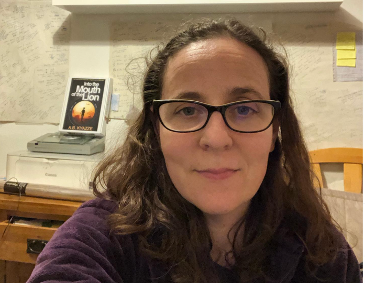
Life as a writer with Amelia mostly working from her home office.
Thanks, Amelia. These are great insights for wannabe writers and aspiring authors. To connect with Amelia, you can vist her website. And if you’ve read any of her books or any appeal to you, feel free to leave a review. It’s a great way to support writers and help them reach new readers.
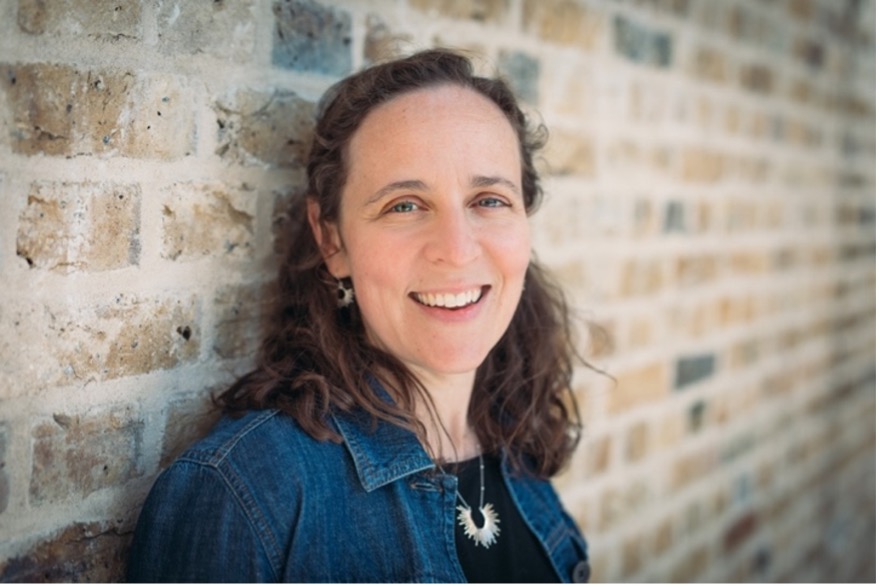
Getting a book deal with HarperCollins is such a big deal! That’s amazing. I can’t wait to read The Cafe on Manor Lane and especially love that it’s going to be an audio book because that’s how I read 98% of my books. This is the type of book I could easily read and chat about in my book club.